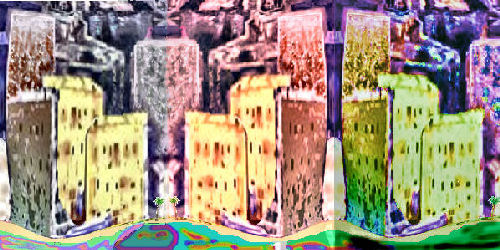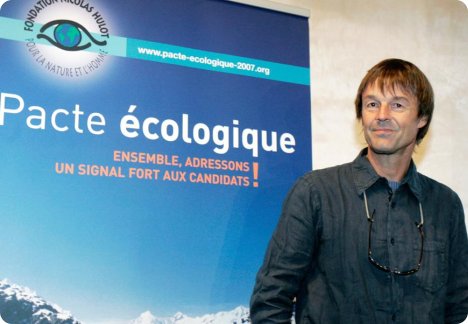
A broadcast debate on the Canadian Broadcasting Commission between on the one hand Paul Watson of the Sea Shepherd Conservation Society, which actively campaigns in the oceans of the world to preserve whales and other forms of endangered marine life and, on the other hand, Elizabeth May, now leader of Canada's Green Party showed two poles of North American environmentalism, one authentic and one counterfeit. Only the latter enjoys the hear of the official media and the patronage of the gullible who hand their dollars over in the belief that something is being ‘done’ about the environment. In fact, the purpose of environmental NGOs is to do nothing about the environment, to keep problems unsolved, so they have a raison d'etre. Watson is the only one who speaks the truth.
As always, the CBC gave the last word to the politically correct, soft green, growthist, Elizabeth May.
Paul Watson vs. Elizabeth May
The following is a transcript of a CBC interview conducted on May 17/06 with Paul Watson and Elizabeth May, now leader of Canada's Green Party. It was transcribed from a CD by Brishen Hoff.
Anna Maria Tremonte (host) : And the latest numbers show the population of the US grew by 2.8 million people from 2004 to 2005. Half of them identify themselves as hispanics. It is precisely those growth numbers that have some environmentalists raising concerns and raising hackles, arguing that immigration is central to the United States environmental problems. It's causing rifts among
environmentalists and raising lots of questions and that is where the current begins today.
[Theme music]
Well what began as a skirmish is looking more and more like an all out war. For months now an intense debate about immigration policy has been simmering south of the border. Earlier this month supporters of an open immigration policy upped the stakes as millions of people took to the streets in cities across the US. On Monday, President George Bush fired back announcing he was deploying the National Guard to the Mexican border, "We do not yet have full control of the border, and I am determined to change that. By the end of 2008, we will increase the number of border patrol officers by an additional 6,000. When these new agents are deployed, we'll have more than double the size of the border control during my presence."
Well as both sides dig in for a prolonged fight, those advocating less immigration have found an unlikely ally inside the environmental movement. Paul Watson, the one-time co-founder of Greenpeace, later the founder of the Sea Shepherd Conservation Society, has thrown himself headfirst into the debate by challenging the environmental movement to come clean about what he says are the links between immigration, population growth and resource depletion. And Paul Watson is on the phone from Seattle this morning.
Good morning.
Paul Watson:
Good morning.
Anna Maria Tremonte : Why are you convinced that immigration is a problem for the environment in the United States?
Paul Watson : Well you know the United States has got one of the fastest growth rates of
any country in the world, and immigration is a major contributor to that. At
a growth rate of 1.3% a year, that's going to give us a population of 1
billion in the United States by the end of the 21st century.
Anna Maria Tremonte : And why is that bad?
Paul Watson : [LAUGHS] Well the average American consumes much more than the average citizen of other countries, so everytime you have a new American you increase the consumption of resources considerably. The US is also responsible for 25% of all the greenhouse gases emissions in the world, so more Americans, more pollution, more sprawl, more problems.
Anna Maria Tremonte : Well, but new immigrants aren't really the big energy consumers in North American society. Why do you focus on immigrants and not the stereotypical
Hummer-driving air conditioning American?
Paul Watson : Well we do do that too, but the fact is is that every year almost 3 million people are added to the US population and most of that is from immigration. In fact, all we're advocating is that immigration numbers be reduced to levels to achieve stabilization of population. By birth rates alone in the United States, you don't have that increase. Immigration is solely responsible. Not only immigration but births by immigrants, because the birth rate amongst immigrants is far higher than the birth rate amongst non-immigrants.
Anna Maria Tremonte : Why is that?
Paul Watson : I don't really know except that people who enter the country have a higher birth rate than people who are already living here. That's just an established fact.
Anna Maria Tremonte : Are you looking at the US and looking at where there is ecological/environmental damage and attributing it to how many people are living there? Is that what you're doing?
Paul Watson : Well yes, because everytime people come into the US they greatly increase their rate of consumption of resources. The other problem we're concerned about is that there is terrific damage being done especially in the desert regions of the southwest because of people coming over that border everything from garbage to trampling of species and this is not only done by immigrants but also by the patrols against the immigration. So there's that consideration to be taken into account. You know the problem is is that if we don't control the numbers of the overall US population, we're headed for some very serious problems. The United States is already running out of valuable resources especially water.
Anna Maria Tremonte : So, but is it a point of you just have too many people in one place in the US? What if they all moved to Missouri or something?
Paul Watson : No, I think generally its right across the board. But the other problem is that we have an acceptable form of slavery in the United States. When I was recently a director of the Sierra Club I put forth a motion that one way to deal with this is to demand that farm and factory workers wages be increased and that they be given full benefits and that would discourage a lot of the illegal immigration. But you know people don't really give much thought to the fact that in the fields of California, people are working in very toxic conditions for long hours, for low wages and no benefits and that's just really intolerable, and the only reason it's going on is because big business and big agriculture benefit from cheap labour.
Anna Maria Tremonte : So you're saying that you think the US should curb immigration?
Paul Watson : Yes I think that they should reduce the numbers to achieve stabilization of the population.
Anna Maria Tremonte : Specifically over the Mexican border?
Paul Watson : Right across the board, I don't really discriminate against the origins of where the immigrants come from, it's right across the board.
Anna Maria Tremonte : Now this has been a divisive issue in the Sierra Club. You resigned from its board last month, in part over this issue. Tell us about that.
Paul Watson : Well I resigned in part because of that and also because of the Sierra Club's pro-hunting stance. But the Sierra Club, as is most major environmental organizations have taken a neutral position which means "We don't want to get involved &endash; We don't want to talk about this." You know back in 1972 at the UN Conference On The Environment the population issue was the number one concern on the environment. By the UN Conference in Rio in 1992, 20 years later nobody is talking about it.
Anna Maria Tremonte : Why is that?
Paul Watson : Well, it's become too politically correct. Nobody wants to talk about it. I much prefer to be ecologically correct than politically correct. We have to deal with the fact that it's a contributing factor and we have to deal with the fact that population is the single greatest source for all of our environmental problems. From diversity of species, to pollution, to greenhouse gas emissions. All of this is because there's more and more people. And also, the more people, that means that we have to steal the carrying capacity of other species. They have to disappear for our numbers to increase. And we're going to reach a point where we are going to run out of key species and everything is going to collapse because of the ecological law of interdependence.
Anna Maria Tremonte : You, yourself are an immigrant.
Paul Watson : Yes, I'm a permanent resident of the US. I'm a Canadian citizen.
Anna Maria Tremonte : Aren't you part of the problem?
Paul Watson : Oh yes, we're all part of the problem.
Anna Maria Tremonte : What are you suggesting? Are you suggesting sending people back?
Paul Watson : No, I'm just saying that we have to reduce the number of people coming into the United States to achieve stabilization. That is, there's already limits, there is no open borders. So, I'm saying lower those limits so we don't have an increase in the population of 2.8 million people every year.
Anna Maria Tremonte : You know, reducing immigration doesn't reduce the population on the planet, just the population of the United States. Why not focus on the global population?
Paul Watson : Well we do focus on the global population but by reducing the number of Americans you're actually addressing the issue of consumption because US citizens consume much more resources than other citizens so when somebody crosses that border they become a mega-consumer. You know, maybe not right away, but that's where they're heading and so the more Americans, the greater the level of consumption of resources, the greater the emission of pollution.
Anna Maria Tremonte : Well, it's the environmental footprint right?
Paul Watson : Americans have the biggest environmental footprint of any citizens on the planet.
Anna Maria Tremonte : At the same time, immigrants have smaller environmental footprints in their countries of origin often because they're poor. So how fair is it to condemn them to poverty by not allowing them to enter the US?
Paul Watson : Well then, what you're doing is condemning the United States to poverty in the future, which is where we're all heading anyway unless we curb population. The other problem is that other countries are trying to solve their population surplus problem by pushing people into the United States. Also it's a brain drain too. A lot of people who could be making a contribution to their countries of origin are coming to the United States. And that's not solving problems in countries like Guatemala and Honduras where people should be helping to make things better in their country.
Anna Maria Tremonte : To what extent do you think the same issues apply in Canada?
Paul Watson : I think Canada also has a problem too because our population is growing and that means more wilderness area is being taken up. And my big concern is that as people come in, the sprawl increases, there's more and more impact on wilderness. I mean for instance we have this situation in the United States where they don't understand why the alligators are attacking people. Well the reason the alligators are attacking is we're moving into their territory, we're taking their ecosystems and they're trying to survive and everybody's saying "It's amazing, why is this happening?" Well because we're invading.
Anna Maria Tremonte : Do you think President Bush's announcement this week calling for National Guard troop reinforcements on the US/Mexico border is a step in the right direction?
Paul Watson : Oh I think he's just posturing. I mean, 6,000 National Guard isn't going to make any difference at all. Really what they should be doing is enforcing US law against employers of illegal immigrants and the key to that is to make sure that people couldn't hire illegal immigrants in the farms and the factories, that would certainly go a lot further to discourage illegal immigration. I mean we're talking here of legal immigration of 2.8 million people every year. But the other factor is illegal immigration which is anywhere from 11 to 20 million illegal immigrants in the United States.
Anna Maria Tremonte : But you want to see them cracking down on both essentially. Not only illegal, but you want legal immigration to be reduced?
Paul Watson : Yes
Anna Maria Tremonte : Paul Watson, thanks for talking to us today.
Paul Watson : Thank you.
Anna Maria Tremonte :
Paul Watson is the founder of the Sea Shepherd Conservation Society. He was
also one of the founders of Greenpeace and he was on the phone from Seattle.
You're listening to The Current on CBC Radio One and on Sirius Satellite
Radio 137. I'm Anna Maria Tremonte.
Anna Maria Tremonte (conitinuing) : Well not everyone in the environmental movement agrees with Paul Watson's argument about the links between immigration and environmental degradation. Elizabeth May is a candidate for the leadership of the federal Green Party. She's also the former executive director of the Sierra Club of Canada, and she is in Syndey, Nova Scotia this morning.
Hello.
Elizabeth May : Good morning Anna Maria.
Anna Maria Tremonte : Well what do you think of what Paul Watson is saying? He says that anti-immigration opinion is something that environmentalists are afraid to talk about.
Elizabeth May : Well we've never been afraid to talk about it in Canada and as you mentioned I just recently stepped down as executive director of the Sierra Club of Canada and while I was there, we answered it across countries with a set of discussions and seminars and came up with what I think is a very good policy in relation to immigration and the interrelationships which are far more complex than Paul has suggested, between immigration, population pressures, consumption, militarism, women's rights. It's a very complex web, and to say that immigration is the problem is really to put the emphasis on something that is, when you really look at all the various factors, it's basically trivial. I mean, only 3% of the world's population dies in a country other than that in which they were born and most of that migration is from developing countries to developing countries, not coming into North American consumptive societies, so the key factor here in environmental destruction, as Paul hints of course, is that North Americans consume far more than any notion of fair share and far beyond any sense of the carrying capacity of the planet. So when you have 4% of the world's population which is the United States, producing 25% of the planet's greenhouse gases, the answer isn't to make as George Bush seems to think, to make the United States a gated community and put guys with guns at the border so that we can protect, you know, the United States and protect a completely unsustainable and highly polluting and unnecessarily consumptive way of life to achieve the quality of life they want. There's other ways to do that and it means unhooking themselves from their extremely wasteful use of energy; it's not beating up on immigrants.
Anna Maria Tremonte : He says that global population growth used to be the global environmental movement's number one issue but it disappeared from the agenda in recent years. Why do you think that happened?
Elizabeth May : Well it's not quite like Paul &endash; it is true that I don't think there's any question that environmental groups are concerned about population increases. I mean, the doubling from 3 billion to 6 billion people occurred in my life time. The historic trend it is more than, you know, an astonishing reality that 2000 years ago the population on earth was 200 million people. It took 1500 years for that to double to 400 million, so there are exponential rates of growth. Population is a clear global issue of which immigration is merely a trivial factor, but when you look at the issue of population and why it is such a significant environmental threat, it's entirely linked to the question of how much is each person on earth consuming, and whether those rates of consumption are sustainable.
Anna Maria Tremonte : So where does global population growth rank then as a threat to theenvironment?
Elizabeth May : No, I think it's a huge issue, but it's very much connected to how much we're consuming. So if you figure what the carrying capacity of planet earth, maybe it's six billion people living like Ghandi or, you know, a couple hundred thousand living like Bill Gates. It's very much related to how much each person is consuming and how do we, you know, it's critical that North American society, because Canadians have just about as large an ecological footprint as the United States, it's critical that we reduce that enormous impact that we're having, otherwise the climate crisis is going to rather redress our standard of living for us.
Anna Maria Tremonte : So is it not true then that the one place that you don't want more growth then is a place like the US that already has such consumption?
Elizabeth May : The issue is really one that's far too complex to say the problem is more immigrants. If you look at Canadian environmental problems, our biggest increase in greenhouse gases and our biggest loss of boreal forest is happening in the Athabasca tar sands and that's not because of a mass migration of people from other countries rushing there and destroying the environment. That's immigrants like Shell and Exxon. So we have to look at what the real issues are and where we have increased sprawl which is a real problem, it's related to bad land use planning. It's related to bad policies that'll affect where immigrants settle and it'll affect where Canadian born settlement occurs. This is, actually, you know, everyone in Canada who isn't First Nations is an immigrant, we've got to deal with land use planning so that we're not building increased levels of suburban sprawl in areas which are critical wildlife habitat. That is happening in Canada. It is a problem, but curbing immigration is really focussing on the wrong, and rather trivial aspect of the overall problem.
Anna Maria Tremonte : How should countries then that rely on immigration for population growth balance that with environmental concerns?
Elizabeth May : Well it's really that for all of us we need to reduce the amount of energy we're consuming, the amount, and that's a basically a factor in increasing the efficiency of the way in which we use energy and raw materials. The global economy just to give you an example, produced in North America, achieved a revolution in productivity, in reducing the amount of labour per unit of good produced per unit of energy. It was just a huge efficiency in the number of people employed to produce goods. We need to do that again by reducing by a factor of ten, which is doable on the technologies that are available, the amount of energy we're using to get the same quality of life; the same lighting, the same heating, the same cooling can all be achieved at a fraction of what we're now consuming because we've underpriced raw materials and carbon and underpriced energy and we've overpriced labour, so we've skewed, it's all a question of responding to, really to, fiscal signals.
Anna Maria Tremonte : Paul Watson though is not alone in what he says. How much of a wedge issue is immigration amongst environmentalists in the US?
Elizabeth May : In the US it is and I think it's unfortunate because I know that Paul's motivations are completely honourable. People have attacked him as a racist or something. It's not the case at all. He's genuinely someone concerned particularly about the fate of non-human life on this planet and that is a critical concern. We're in a biodiversity meltdown. We're in an extinction crisis and by focussing on immigration I must say that's the most divisive and unhelpful way to approach the issue of what can humanity do to reorient ourselves on this planet so that we can both live in peace with each other and not destroy our life support systems.
Anna Maria Tremonte :Well how damaging do you think his line of reasoning is then to the image of the environmental movement?
Elizabeth May : Well it was fairly disastrous in terms of just the mere fact that Sierra
Club US was considering, because it's a democratic organization, by their constitution, they had to consider the referendum put forward by a minority of members to vote on an immigration policy. The immigration policyproposed, that Paul supported, was roundly seen by the membership of Sierra Club US, but I bet a lot of listeners right now are thinking "Oh yeah, I remember something about that, about Sierra Club US thinking that we should, you know, that we should, stop immigrants as if they were toxic waste". Well that is, you know, not an acceptable position but the mere fact that it was debated I think has done some long-term damage to the reputation.
Anna Maria Tremonte : If the US experienced a serious population decrease, how much would that relieve the pressure on the environment?
Elizabeth May : Well it depends on how much they're consuming. If the United States consumption of, particularly of fossil fuels, continues its current rate which, you know, if it's an advantage to reduce the population but if every family bought themselves an SUV or moved from an SUV to a Hummer, it would make no difference at all.
Anna Maria Tremonte : So what should US environmentalists who are genuinely concerned about population growth be doing to address this issue?
Elizabeth May : No, I think the key thing is to protect wilderness by having the kinds of laws that ensure that land use planning does not involve sprawl into areas which are critical and threatened ecosystems and at the same time we need to fundamentally re-examine the consumption patterns, our dependency on cheap and very highly polluting fossil fuels to improve and regulate vehiclestandards. You know, the Bush administration in addition to putting guards at the border to Mexico is in court fighting Arnold Schwartzenegger in California having these tougher laws to get better fuel economy from their automobile fleet. So, they're opposing those very simple straight-forward measures that would mean that every American driving would pollute less. So it's a really complicated web and I'm sorry I'm giving complicated answers but a simple solution is wrong when the answer is, when the question is complicated.
Anna Maria Tremonte : Elizabeth May, we have to leave it there. Thanks for talking to me today.
Elizabeth May : Thank you, Anna Maria.
Anna Maria Tremonte : Bye Bye
Elizabeth May : Bye.
Anna Maria Tremonte : Elizabeth May is a candidate for the leadership of the federal Green Party. She's also the former executive director of the Sierra Club of Canada and she spoke to us from Sydney, Nova Scotia this morning.
May says that immigration, at 3% of the world's population, is “trivial”. Trivial to whom? To the workers whose jobs are displaced and whose wages are depressed? (Rubenstein, Briggs, Borgias). Trivial to the taxpayers who must pay for the social services of immigrants? (Robert Rector study, Heritage Foundation 2006, Grubel study, Fraser Institute 2006). Trivial to those who fight traffic gridlock, suffer pollution, housing shortages and inflated prices and loss of farmland? Is it trivial to the Israelis, the Spanish, and the Indians who have also resorted to building expensive walls to keep migrants out? Will the prospect of 300 million global environmental refugees be trivial?
May speaks of laws that ensure that land use planning will not involve sprawl into areas that are critical to threatened ecosystems. What kind of ironclad laws would they be? The kind that Portland, Oregon had? The kind that was supposed to keep Yosemite safe from mining companies? The kind that is supposed save the Steve Irwin Nature reserve? Bullshit. There is no sanctuary from human population growth. “Smart” Growth is a fraud and a snare.
May talks of vehicle standards and Bush's opposition to Schwartzenegger's fuel economy plans. The best fuel economy plan would be to reduce the number of drivers on the roads. With nearly 3 million of them entering the country every year by legal means alone, May's focus on tech efficiency is a joke.
“Everyone who isn't First Nations is an immigrant”. Give me a break. When is someone going to call May out on her racist self-loathing? The “First Nations” emigrated from across the Bering Strait, and one wave displaced another. Each tribe or band occupies land that was taken by the conquest or annihilation of a previous “First Nation”. I am a Caucasian but I was born in this damn country. That makes me as “native” as anybody. If there is to be a hierarchy of Canadianism based on seniority, then I am more Canadian than 80% of the aboriginal population of the country who are younger than I am. May continually makes reference to the inherent “wisdom” of First Nations peoples in matters of resource management, despite their appalling record. Would she make similar references to the inherent “cleverness” of Jews, or the inherent “rythym” of blacks, or the inherent parsimony of Scotsmen?
 Tim Murray
Tim Murray
See also: Sea Shepherd appeals for Greenpeace's cooperation in fight against whale slaughter
Were "Intact Aboriginal Cultures" really good custodians? of 19 Jun 08.
 Tim Murray,
Tim Murray,



 The University of Western Australia wants to bulldoze rare bushland in the middle of our city for future property development. The Minister for the Environment David Templeman is soon to make his decision on whether 60% of this pristine 36 hectare bushland will be destroyed to make way for offices and housing.
The University of Western Australia wants to bulldoze rare bushland in the middle of our city for future property development. The Minister for the Environment David Templeman is soon to make his decision on whether 60% of this pristine 36 hectare bushland will be destroyed to make way for offices and housing.







Recent comments